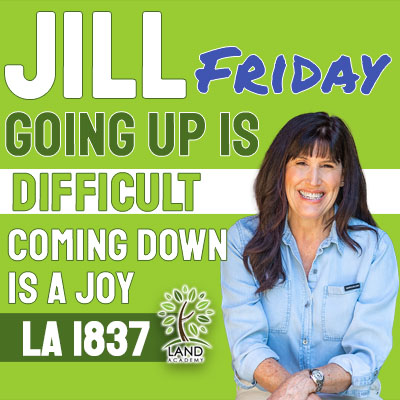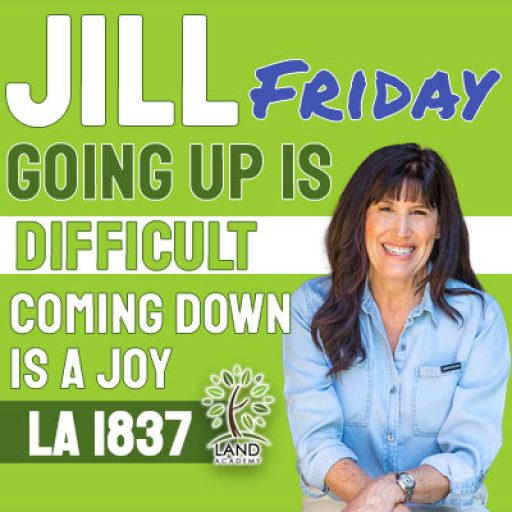Jill Friday – Going up is Difficult Coming Down is a Joy (LA 1837)
Jill Friday – Going up is Difficult Coming Down is a Joy (LA 1837)
Transcript:
Steven Jack Butala:
Steve and Jill here.
Jill K DeWit:
Hi.
Steven Jack Butala:
Welcome to the Land Academy Show, entertaining land, investment talk. I’m Steven Jack Butala.
Jill K DeWit:
And I’m Jil DeWit, broadcasting from the Valley of the Sun.
Steven Jack Butala:
Today’s Jill Friday. And she’s going to talk about how going up is difficult, but coming down can be a joy.
Jill K DeWit:
And I stole this from you. You mentioned this as part of this series in-
Steven Jack Butala:
Health and wellness.
Jill K DeWit:
Yes, health and wellness.
Steven Jack Butala:
Like yesterday.
Jill K DeWit:
That was couple weeks ago, our own little family mantra. Like, “Okay. Here’s what we’re focusing on now, everybody health and wellness.” When I say everybody it’s the two of us here. And so you’ve been taking it seriously.
Steven Jack Butala:
Yes.
Jill K DeWit:
And I really appreciate that, including going to the doctors and things like that. Really focusing on it.
Steven Jack Butala:
Catching up on all that stuff.
Jill K DeWit:
I’m really glad.
Steven Jack Butala:
Before we get into it, let’s take a question posted by one of our members on the landinvestors.com online community. It’s free. And I hope you know by now, we have revamped, fresh for 2022, parcelfact.com.
Jill K DeWit:
Yah.
Steven Jack Butala:
Used to be called neighborscoop.com. We rolled two sites, took the best of two sites that we’ve had, and made them one, parcelfact.com. F-A-C-T. And check it out, because it’s the easiest way to do Phase 1 due diligence on land. You can do it right when you’re on the phone with the seller and see if you want to buy the property or not.
Jill K DeWit:
It’s amazing. There’s a day pass, go check it out.
Steven Jack Butala:
Or you can join us on a Thursday call, as a guest on a Thursday webinar, where we use ParcelFact all throughout that, the webinar, to review people’s transactions in our group.
Jill K DeWit:
Yep. Scott wrote, “Okay. Can someone explain to me why there even exists an affidavit of seller’s gain? Why on earth? Why would I want to tell the buyer how much money I made?” I wonder what state this is.
Steven Jack Butala:
I agree with you, Scott?
Jill K DeWit:
What state is this?
Steven Jack Butala:
Every state, or most states, have an affidavit that goes behind a deed that says, “I sold this property for X to somebody.”
Jill K DeWit:
It doesn’t say what I bought it for though.
Steven Jack Butala:
It doesn’t say what I bought it for. Why? The deed goes to the recorder when it gets sent into the county, and it gets recorded in the new person’s name and the buyer’s name. And that affidavit goes to the assessor. And the assessor makes a choice, “I’m going to reassess this property based on this new value.” And probably the taxes on the property are going to go up, that’s why.
But I agree with you, Scott. It’s a lot of extra paper. It’s extra stuff to do. And I think it should be on the assessor to see which properties have sold and then assess them that way. I don’t think [inaudible 00:02:39]-
Jill K DeWit:
This is a lazy thing is what you’re doing.
Steven Jack Butala:
Exactly.
Jill K DeWit:
Yeah. Because hello, dear assessor. You can pull the last paperwork and see what the affidavit of property value was two months ago when I bought it. And then you see the new one when I’m selling it, and do the math.
Steven Jack Butala:
And what if, as buyers, because that’s what we do here, we buy property inexpensively, very, very often for less than what the seller paid years ago. Does our tax rate go down? Nope.
Jill K DeWit:
Oh yeah. Hey, by the way, I got something to share with you that’s kind of interesting before we jump into the topic, because it’s happening right now today. We have a property listed with a Whitetail property guy. It’s a deal funding property, and the buyer who buys … He has an oil and gas company, so he is buying this land from us. We were going to go through escrow and do it all the normal way.
Well, we agreed on this two days ago. Today he came forward and said, “Hey, would you guys be open to this? I’m going to walk the property tomorrow or this weekend kind of thing, Monday I’m going to prepare a deed.”
Steven Jack Butala:
Done.
Jill K DeWit:
“I’m going to send you the deed.”
Steven Jack Butala:
Done, done and done.
Jill K DeWit:
“You’re going to sign the deed, overnight it back to me. I’m going to wire you guys the money.” And the only thing is, I’m like … The broker’s a little confused, it’s kind of sweet. I’m like, “Don’t worry. We’ll make sure you and we’ll make sure the deal funder get paid out of that at the same time.”
He needs to send three wires, not just one. But he just wants a copy of our title insurance. Which we’re sharing, which we are whiting out, or blurring out I should say the amount-
Steven Jack Butala:
The price, the title insurance value.
Jill K DeWit:
… of the title insurance because … But he can see that we purchased it with title insurance. And it’s kind of funny because the buyer, it’s like he’s trying to explain it to me and the broker’s trying to explain it to me. I’m like, “You don’t have to explain it to me. I like doing it like this. I like it better too.”
Do I really want to wait and spend the money for title insurance again? And he clearly doesn’t need it, so peachy.
Steven Jack Butala:
This is the first time I’ve heard of this at all and I think it’s a great idea. But I am going to suggest that we do a notary close with a cashier’s check instead of wire transfers, because that way there’s no chance that [inaudible 00:04:44]-
Jill K DeWit:
Oh, that he doesn’t … Well, he was going to wire the money before I wire the documents.
Steven Jack Butala:
Oh, good. Done, done, done.
Jill K DeWit:
That was his idea. So I’m like, “That’s fine with me.
Steven Jack Butala:
Done.
Jill K DeWit:
“Thank you.”
Steven Jack Butala:
Wonder why? Did he say why he doesn’t want title insurance?
Jill K DeWit:
Probably because I just did it. He owns an oil and gas company. He doesn’t need it, he’s not going to build on it.
Steven Jack Butala:
Okay. Good.
Jill K DeWit:
Yeah. I don’t care.
Steven Jack Butala:
That’s a good story.
Jill K DeWit:
He knows what he is doing. I like it.
Steven Jack Butala:
Today’s Jill Friday. She’s going to talk about how it’s easy, on the way up, it’s hard.
Jill K DeWit:
Going up is hard, and coming back down-
Steven Jack Butala:
And coming back down is a joy.
Jill K DeWit:
… is easy.
Steven Jack Butala:
This is the meat of this show.
Jill K DeWit:
Okay, so let’s back up here. You’re getting to enjoy some of our little personal family health and wellness week, or month.
Steven Jack Butala:
You know what, like you care-
Jill K DeWit:
You know what’s funny?
Steven Jack Butala:
… as a listener, what’s going on with us.
Jill K DeWit:
Everybody knows what’s going on. We know what’s going on in your world. We know when you’re mad. We know when you’re focusing on this. We know when you’re doing house renovations. We know when Jack’s excited about things like Starling. We know about the RV trip that’s coming up. We know your kid’s going to college. We know how you feel about your kids. We know how your state is laid out.
So why would you not want to be involved in our personal health and wellness? Lucky you get to be there, so anyway.
Steven Jack Butala:
“And you guys just talk about-”
Jill K DeWit:
I know.
Steven Jack Butala:
“… buying and selling land. Please, spare us.”
Jill K DeWit:
I know. But so this topic came from that conversation, and I took it … Your research was all about life, and I take it, I’m looking at like, “Ooh, that’s like business.” Here’s how I think of it and you can explain what you really meant.
Because I thought, “Ooh, that’s a great topic. I want it for Jill Friday.” And you’re like, “Okay, whatever you’re going to talk about. Sure, I’ll write it down.” I think if going up is hard, it’s just like growing your business.
Steven Jack Butala:
Yeah, that’s what I think too.
Jill K DeWit:
Going up the chain, starting from you on your dining room table with your laptop and your cell phone and a headset, to building a team, maybe getting an office. Having a transaction coordinator, doing more deals. Upping your technology, upping your bank account. All the different programs that you’re going to need now. Adding different things so everybody can communicate.
Just as you grow, that’s nothing to sneeze at. If you’re doing that or have done that or prepping to do that, we know it’s hard, we get it. And we’re right here with you to help you, and we’ve done it. And I think that’s why a lot of you are here in Land Academy because we’ve done it. And we have helped lots of people do that, and we will continue to help you all the way. You call it going from first gear, second gear, third gear, fourth gear, fifth gear, where you’re cruising kind of thing.
Steven Jack Butala:
In Jill’s case there’s seven gears.
Jill K DeWit:
Exactly, or that. For me personally and for other reasons, there’s seven gears. So, that is hard, it’s a lot of work. And then coming down is easy. It is, but it isn’t. The nice thing is when you’re up there and you’re cruising, you have the right team, you have the right systems. You are humming along, doing what you want to do. It’s actually kind of nice when you settle in and you could start looking at the end going …
Because we have a lot of people that are doing this, and it’s not even just retired people. We have a lot of people that are into their, gosh, 30s, 40s, 50s, that are looking at retirement and saying, “I got this now. Wow, I can really make life decisions knowing how to keep this company going. It’s going feed us for the rest of our lives. And maybe I’m teaching my children, by the way.” A lot of people are doing that and they could pass on the family business.
But coming down is easy. For me it’s like, I think of it as settling in and getting to pick to work on only the things that you want to do, the parts of the business that you want to do, the deals that you want to do, the dollar amounts you want to do, all of that. That’s kind of fun when you’re at that point.
Steven Jack Butala:
I mean, this is a good time to bring up my four stages of wealth. Stage one is, you make as much money as you spend. So when you’re in college that’s just not the case, you’re spending a lot more money. Maybe you borrow it or you get it from your parents or whatever.
Jill K DeWit:
Right.
Steven Jack Butala:
You just don’t make as much money as you’re spending.
Jill K DeWit:
That’s true.
Steven Jack Butala:
In most or nearly all cases. You get out of school, or in high school it’s certainly the same case, you get out of school and you get a job. And theoretically, the job is more than what your rent costs and your food and whatever else you’re into. That’s stage one.
Stage two is, you’re getting some traction. You’re actually saving some money. And then stage three, and there’s a lot of ways to slice this, is where, yeah, I mean you’re actually accumulating wealth. And buying and selling land is an amazing way to do that. Stage four is you’re done. You have assets, income-producing property or whatever it is that you’re planning for.
And so going up those first three stages, it’s tough. It’s like literally pushing a heavy object up a hill. It’s just like that. When you get to the top of the hill and you kick that thing back down it’s easy. So whatever your plan is, just have a plan and know that going down’s a lot easier than coming up.
Jill K DeWit:
It is.
Steven Jack Butala:
It sounds silly when I say it out loud, but-
Jill K DeWit:
It is.
Steven Jack Butala:
… that’s what you’re working for.
Jill K DeWit:
Thank you. And happy health and wellness week to you too. Happy you could join us today. Five days a week you can find us here on the Land Academy Show.
Steven Jack Butala:
Join us next week for another interesting episode, because you’re not alone in your real estate ambition. That was pretty foo-foo this week.
Jill K DeWit:
I think that’s good though.
Steven Jack Butala:
Every once in a while somebody contacts me. And I haven’t read through YouTube lately, but they’re like, “Oh my gosh, really? Can you guys keep the philosophy to yourself and just show us how to send a mailer out, please.”
Jill K DeWit:
It’s all tied together, everyone. If you don’t have a good attitude, by the way, your mailer may not get out.
Steven Jack Butala:
That’s it.
Jill K DeWit:
It may not go well.
Steven Jack Butala:
That’s it.
Jill K DeWit:
You may stink at answering the phone or you avoid answering the phone. It’s all tied together.
Steven Jack Butala:
Somebody said recently to me, “Well, you guys, it’s your business. You can choose how to do it.” To which I said, “Yeah, you’re right. You also have a choice on whether or not you’re listening to the show.” If you made it this far through this episode, that’s you.
Jill K DeWit:
Well, or you have your business. How you run your online business and the things that you do. And we want you to, we encourage that. That’s great. Find your own niche is what we always say, so I’m really happy.
There is a special going on right now if you are thinking about joining Land Academy. A few more days left, you can find the details out at landacademy.com. Or send a note to support@landacademy.com, and they will hook you up and give you all the details with the special. And maybe I’m giving away something right now too, so check that out. Uh-huh.
We’re Jack and Jill.
Steven Jack Butala:
We’re Jack and Jill. Information-
Jill K DeWit:
And inspiration-
Steven Jack Butala:
To buy undervalued property.
If you enjoyed the podcast, please review it in Apple Podcasts . Reviews are incredibly important for rankings on Apple Podcasts. My staff and I read each and every one.
If you have any questions or comments, please feel free to email me directly at steven@BuWit.com.
The BuWit Family of Companies include:
I would like to think it’s entertaining and informative and in the end profitable.
And finally, don’t forget to subscribe to the show on Apple Podcasts.















